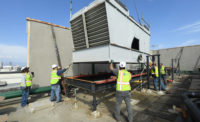ENR Sourcebook General Building
Financial Uncertainty Leaves Firms Cautious

AECOM is building the 67-story Spire London residential tower, set to be the tallest in western Europe.
PHOTO COURTESY OF AECOM
Designers and contractors in several global construction markets continue to contend with political and economic uncertainty heading into 2018. In September, construction in the United Kingdom saw a sustained drop in new work, which led to the first overall contraction in the market since August 2016, according to the IHS Markit/CIPS UK Construction Purchasing Managers’ Survey. Respondents to the survey pointed to economic conditions and uncertainty over Brexit, freezing possible new projects due to client indecision.
“Fragile client confidence and reduced tender opportunities meant that growth expectations across the U.K. construction sector are also among the weakest for four and a half years,” says Tom Moore, associate director at IHS Markit, noting that commercial development has been the worst-performing category in recent months.
Despite losses in the U.K. this year, Skanska continues to push ahead with new work there and reports continued strength in core markets, such as in Nordic countries. In July, Skanska announced a £142-million contract with Consolidated Developments to build the St Giles Circus development, in London. The project includes a mix of residential, commercial office, retail, leisure and entertainment across new and existing buildings.
Balfour Beatty also is seeking financial stability in a shaky U.K. market. The company is more than two years into a plan to recover after losses. The firm reported a return to profitability this year and predicts it will see margins reach industry standards next year. In November, the company announced a new, £287-million contract with the University of Manchester to build its Manchester Engineering Campus Development. The four-year project will consolidate the university’s engineering schools into one facility.
AECOM construction prospects continue to improve in the U.K. and Europe, according to Dan McQuade, president of the firm’s construction services. Following the acquisitions of Tishman Construction and Hunt Construction, AECOM has built a strong construction business in the U.S. and now is looking to replicate that in Europe and other global markets. “I expect that international construction will be the fastest-growing part of our business in the next couple of years,” McQuade says, noting that the firm will leverage its experience with tall buildings and sports facilities.
In June, the company announced it would build the $1-billion Spire London residential tower. When complete, the 67-story, 861-unit project will be the tallest residential tower in western Europe. Chinese firm Greenland Group is the developer. AECOM has worked on other projects for Greenland in Los Angeles, New York City and Sydney.
The company also sees opportunities outside Europe, including in the Middle East. Although construction activity in the Middle East has pulled back in recent years, increased oil prices and some countries’ economic reforms could lead to improved activity, according to analysts. McQuade says AECOM is pursuing a project in Dubai that would be the tallest building in the world.
Despite some improvement, low oil prices continue to hamper development opportunities in countries such as Kazakhstan and Azerbaijan, says Abrar Sheriff, president and CEO of Turner International. Further, the company has seen a pullback in residential and commercial opportunities in India.
However, Sheriff says the company continues to see strong opportunities in Southeast Asia. In Bangkok, the company is the construction manager on a 125-story tower that is in early design as well as a 55-story residential tower that is under construction, he observes. Malaysia and Vietnam also have been strong markets this year, Sheriff adds.
“We’re going to stay true to the markets we’re in,” Sheriff says. “We’re not looking at an expansion [into new markets], just growing the markets we’re in.”




